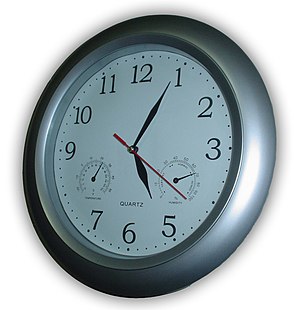| 正面 | 2652.clock 英 [klɒk]美 [klɑk]     |
|---|---|
| 背面 |      释义: 1. pregnant(怀孕)扑来个男的。n. 时钟;计时器vt. 记录;记时vi. 打卡;记录时间n. (Clock)人名;(英)克洛克 例句: 1. It was just gone 7 o'clock this evening when I finished.今晚我做完的时候刚过7点。 clock 钟拟声词,模仿钟表滴答的声音,比较click. clockclock: [14] The clock appears to have been so named because it told the hours by the chiming of a ‘bell’, medieval Latin clocca. The Latin word, which emerged in the 7th century and may have been of Irish origin, probably reached English via Middle Dutch klocke. Besides being applied to time-pieces, it has also lent its name to two garments on account of their supposedly bell-like shape: cloak [13], which comes from the Old French dialect cloke or cloque, and cloche hat [20], from French cloche ‘bell’.=> cloak, clocheclock (n.1)late 14c., clokke, originally "clock with bells," probably from Middle Dutch clocke (Dutch klok) "a clock," from Old North French cloque (Old French cloke, Modern French cloche), from Medieval Latin (7c.) clocca "bell," probably from Celtic (compare Old Irish clocc, Welsh cloch, Manx clagg "a bell") and spread by Irish missionaries (unless the Celtic words are from Latin); ultimately of imitative origin. Replaced Old English dægmæl, from dæg "day" + mæl "measure, mark" (see meal (n.1)). The Latin word was horologium; the Greeks used a water-clock (klepsydra, literally "water thief"). Image of put (or set) the clock back "return to an earlier state or system" is from 1862. Round-the-clock (adj.) is from 1943, originally in reference to air raids. To have a face that would stop a clock "be very ugly" is from 1886. (Variations from c. 1890 include break a mirror, kill chickens.) remember I remember That boarding house forlorn, The little window where the smell Of hash came in the morn. I mind the broken looking-glass, The mattress like a rock, The servant-girl from County Clare, Whose face would stop a clock. [... etc.; "The Insurance Journal," Jan. 1886] clock (v.)"to time by the clock," 1883, from clock (n.1). The slang sense of "hit, sock" is 1941, originally Australian, probably from earlier slang clock (n.) "face" (1923). Related: Clocked; clocking.clock (n.2)"ornament pattern on a stocking," 1520s, probably identical with clock (n.1) in its older sense and meaning "bell-shaped ornament."" |